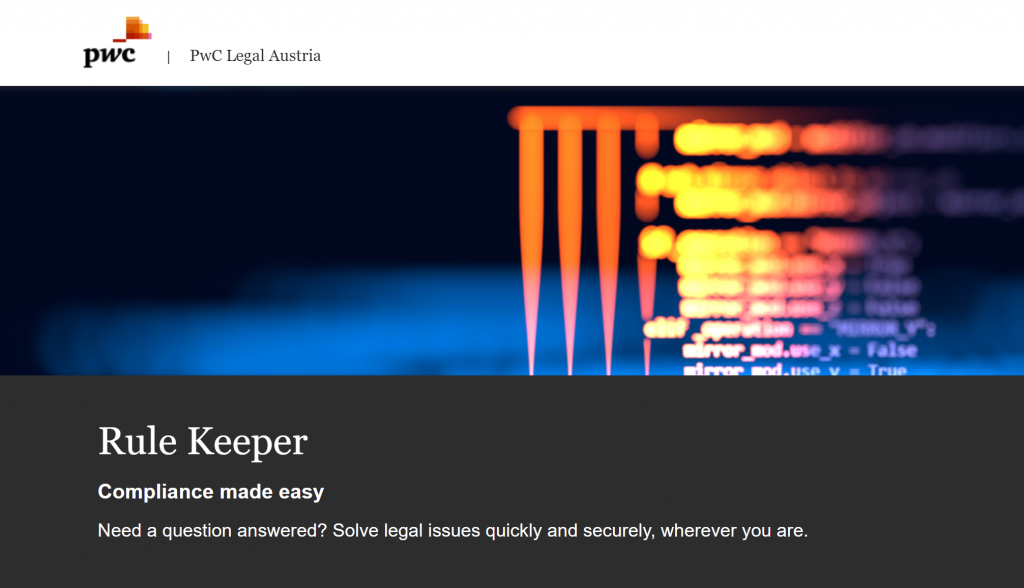Over 100 PwC lawyers have been trained to use BRYTER’s no-code platform. This forms part of PwC’s strategy to embed BRYTER as a key technology in their legal service delivery. One of the first solutions, developed by the Austrian PwC Legal Team is increasingly becoming a favorite among their clients.
PwC lawyers across Europe are equipped with BRYTER’s no-code service automation platform, enabling them to offer clients digital applications. One of the first solutions they’ve built and delivered is called Rule Keeper. This provides clients with a suite of digital applications for regulatory decision-making processes, whereby recurring legal issues can be efficiently handled and resolved. The offering is not only aimed at legal and tax departments, but also compliance and data protection.
BRYTER is the first technology of its kind to make the potential for automation available to all business decision-makers. It provides professionals with a powerful toolkit for digitalization. Digital applications can be developed without the need for prior programming skills. Functional components can be put together and combined as desired via an intuitive and easy-to-understand user interface, very much like digital Lego bricks. BRYTER’s no-code app builder enables powerful business applications to be easily built, maintained, and delivered internally or to clients.
PwC Legal has long been a leader in legal technology and has embraced how it continues to change the way legal advice is provided. In addition to document automation, which is already part of PwC Legal’s technology portfolio, PwC Legal also uses machine learning software for document analysis. The automation of decision-making processes is now being added as a third technology group. With BRYTER, PwC Legal is expanding their service offering to include digital applications.
Automation of legal services: A new technology group
PwC’s first applications were developed by the corporate M&A and commercial practices to provide interactive legal advice on standard or frequently asked questions. For example, self-service apps were developed to: (a) determine whether to choose a share or asset deal; (b) apply rules of conduct in the event of data protection violations; or (c) identify whether the supervisory authority must be informed of a personal data breach in accordance with the Data Breach Notification (GDPR) via a data breach reporting assistant.
Enter Rule Keeper to solve urgent client needs
When PwC published Rule Keeper, one of their goals was to combine professional services and compliance expertise with technology skills.
“Digitization also affects how we do our work,” says Christian Öhner, Managing Partner at PwC Legal Austria and Global Legal Tech Leader. “Rule Keeper is a product that enables our clients to map standardizable decision-making processes more efficiently in the future.”
Rule Keeper includes applications that digitize standardizable legal decisions. This offers more autonomous and, ultimately, faster dissemination of expertise and advice at any time. Answers can be generated automatically, particularly for repetitive legal questions, whilst simultaneously generating documents or triggering certain actions (e.g. emails or approvals). This approach has two advantages, especially for legal and regulatory experts: (a) content is easy to enter and update; and (b) the applications developed are highly transparent.

Christian Öhner is Managing Partner at PwC Legal Austria. Before launching PwC Legal Austria in September 2016, he worked with renowned international law firms and a leading strategy consulting firm. Christian is an experienced specialist in the field of M&A and has over 13 years of experience in Financial Services, Private Equity as well as Asset Management.
With Rule Keeper, legal know-how can be conveyed in a simple and intuitive way and made available digitally at any time. This alleviates capacity issues for legal and compliance departments so they can spend more time dealing with higher-risk outliers. In addition, there is a full audit trail behind the use of the Rule Keeper applications which, in many cases, fulfills further compliance requirements.

Bridging the technology gap
No-code platforms close the gap between legal professionals and product development teams and – more importantly – speed up the delivery of expertise to our clients.
Christian Öhner, Managing Partner at PwC Legal Austria
Before no-code platforms like BRYTER were available to lawyers, product developers, with little to no client contact, were leading the development of digital client-facing applications. This often resulted in significant lead-in time to get a product to market alongside a lot of reworking of the product to ensure that it was fit for the client’s purpose. Product developers would work through numerous iterations of the application in a silo with the lawyers having little visibility as to whether the product fit the client’s needs.
With no-code platforms, lawyers are now able to develop the products themselves, which makes it much easier to build solutions that clients really need. Lawyers can implement requests from clients quickly because they have a better understanding of their client’s requirements and have the subject matter expertise to get the job done.
BRYTER is empowering those 100 lawyers at PwC legal to build, customize and deploy enterprise-ready software within a fraction of the time it previously took. This has the added benefit of lowering the overall return on investment bar and opening up more opportunities for PwC legal to deliver valuable expertise.
We see enormous potential in this type of product development because our lawyers are now dealing with issues such as user-friendliness and comprehensibility themselves. In the end, the product benefits from this, because much more technical practical experience flows into the development.
Silke Graf, Head of Legal Tech at PwC Legal Austria.
Silke Graf manages Legal Tech & Knowledge Management at PwC Legal Austria and also advises in the areas of data protection law and industrial property rights, in particular, in unfair competition, trademark law and copyright matters. Before joining PwC Legal, Silke was working in a renowned Viennese boutique law firm and most recently gained experience in companies that develop software for the legal industry. Due to her engagement in the field of Legal Tech, she was awarded as “Woman of Legal Tech 2018” for Austria, Germany and Switzerland.

The benefits of no-code for service providers in the digital age
No-code applications are becoming increasingly effective in tackling the challenges of today’s clients. Workload for in-house legal teams is expected to increase 25% through 2024 while headcount will only increase by 3% (EY Law). GCs see automation and digital tools as a solution, but without experience choosing and implementing these tools, they are turning to service providers for help. Rule Keeper has done a fantastic job at handling the increasing volume of client questions. Not only has it been implemented quickly but it is simple for clients to use and enables complex workflows to be adapted rapidly and efficiently to the requirements of each PwC client.
As an added bonus for global companies, physical distances between clients, lawyers and software developers are no longer an issue. In times when governments and organizations are having to respond quickly to changing circumstances, Rule Keeper can be reconfigured within hours to offer clients bespoke, up-to-date tools. This enables PwC Legal’s team to stay agile and ensure clients’ issues are resolved in a timely and consistent manner.
Automation keeps legal teams agile — and happy
BRYTER’s technology is helping PwC Legal’s teams in two important ways. First, they can more effectively measure the way their clients interact and engage with their services because every request is stored and documented centrally. This allows PwC Legal to have a better understanding of their clients’ needs and to be even more proactive about the services they can offer. Second, the lawyers and compliance professionals are freed up to focus on the higher-value outlier work that goes beyond the norm and further delight’s their clients.
About PwC
PwC is a global network of firms in 157 countries and employs over 276,000 people. The company operates in the fields of auditing, tax consultancy, business and management consultancy. PwC is one of the world’s four largest auditing firms in terms of turnover, making it one of the Big Four.
Find out more at www.pwc.com. PwC refers to the PwC network and/or one or more of its member firms, each of which is a separate legal entity. Please see www.pwc.com/structure for further details.
About BRYTER
BRYTER is the no-code app builder that enables business experts to build digital apps. BRYTER gives enterprise teams the tools to build digital applications to provide faster, more accurate services to their colleagues, without programming. BRYTER is especially geared to professionals in law, compliance, accounting and finance, who use workflow automation and no-code to streamline complex, recurring decisions and scenarios. Global brands from consumer industries (McDonald’s), through financial services (ING Banking Group) to professional service firms (Deloitte, PwC and KPMG), use BRYTER to deliver services digitally. BRYTER is a remote-first company with offices in New York, Boston, London, Paris, Frankfurt and Berlin.
For more information on this collaboration between BRYTER and PwC: communications@bryter.io